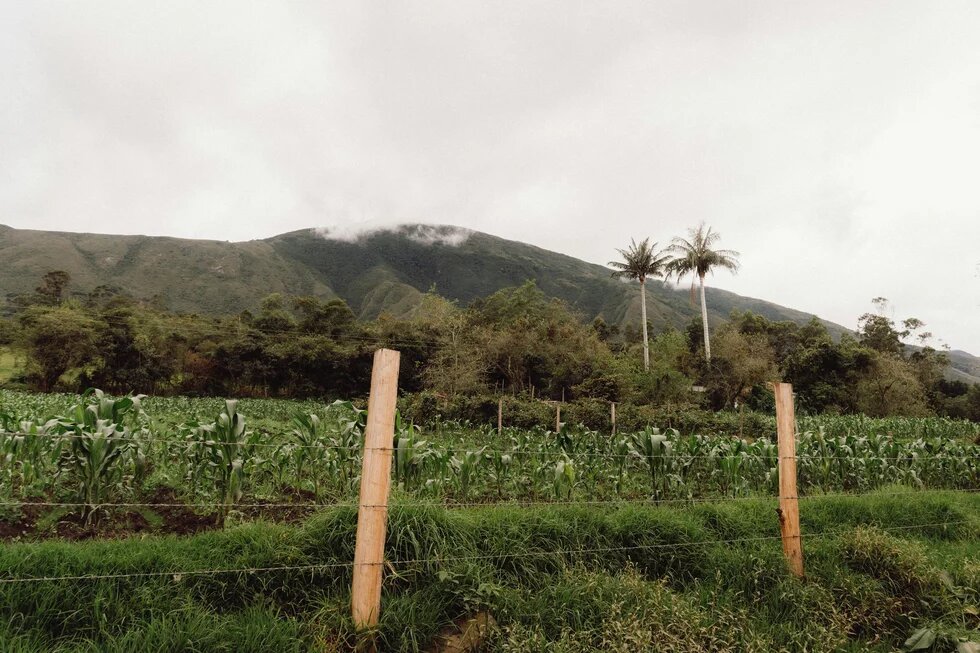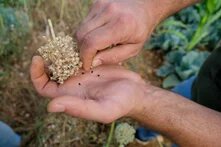Adopted in 2024, Colombia's first Public Policy on Agroecology marks a national milestone and a historic achievement for the social movements that have long advanced agroecology. The article explores its key outcomes and remaining challenges.

Agroecology began as a socio-environmental movement in the early 1970s. This was a direct response to the environmental and social damage caused by the Green Revolution technological package, or conventional agriculture. This conventional agriculture expanded globally using monocultures, high soil mechanization, fertilizers, poisons, and hybrid and transgenic seeds.
The evolution of agroecology has led to a broad conceptual development. Over time, different approaches—science, a set of practices, and a social movement—have been integrated.
Background of the Public Policy on Agroecology in Colombia
In Colombia, various social organizations, networks, and autonomous groups have promoted agroecology and "agricultures for life" for several decades. They used strategies and actions like agroecological schools, peasant schools, seed networks, agroecological promoters, community bio-factories, agroecological transition projects, custodians, native and creole seed houses, agroecological markets or stores, and participatory guarantee systems (PGS), among others (Resolution 331 of 2024).
Social movements and organizations worldwide have made agroecology a priority in their processes and agendas. They have also promoted strategies and actions to include it in public policies. The international peasant organization La Vía Campesina, in its final declaration from its 8th International Conference in Bogotá, Colombia, in 2024, stated:
We propose a radical shift toward agroecology. This will allow us to face the challenge of producing sufficient healthy food while reactivating biodiversity and cooling the planet. Peasant agroecology is the only food production model that guarantees the continuity of life on the planet (La Vía Campesina, 2024).
Several countries globally and regionally have defined public policies on agroecology. Others have incorporated agroecology into sectoral public policies related to agriculture, food security, and the environment (FAO, 2021). The Agroecology Coalition was created in 2021 during the United Nations Food Systems Summit. This Coalition brings together over 200 organizations and 50 governments from Africa, Asia, America, and Europe (Agroecology Coalition, 2023).
The first reference to agroecology in Colombian public policy resulted from a dialogue and consensus process. This process involved various social organizations and institutions during the construction of the Public Policy for Peasant, Family, and Community Agriculture (Resolution 464 of 2017). This effort successfully included some agroecology guidelines in that government strategy.
In Colombia, several factors enabled the start of the Public Policy on Agroecology construction process in 2024 (Resolution 331). These factors included the momentum that various social organizations and platforms gave to the policy. The positioning of agroecology in the global discussion on public policies was another factor. Finally, the political shift to an alternative government opened the door to historical social demands.
A historic achievement for the Colombian social movement.
The first Public Policy on Agroecology in Colombia was presented on October 30, 2024, during the 16th United Nations Biodiversity Conference. Ministry of Agriculture and Rural Development adopted it through Resolution 331 of 2024. This is recognized as a historic achievement for the Colombian social movement and a significant step toward transforming food systems. This policy also represents a major step forward in recognizing the rights of the Colombian peasantry (National Planning Department, 2025).
This achievement joins other recent gains for this historically excluded social sector. Key among these are Legislative Act 01 of 2023, which recognizes the peasantry as a subject of special constitutional protection; Decree 780 of 2024, which regulates Peasant Agro-food Territories; the establishment of new Peasant Reserve Zones; and historic progress in implementing agrarian reform.
Achievements and Lessons Learned from the Public Policy on Agroecology
The policy initiative came from various social organizations with agroecology processes in different Colombian regions and territories. These organizations called a National Agroecology Meeting in Bogotá in September 2022 at the headquarters of the Bogotá, Colombia office of the Heinrich Böll Foundation. Forty-five social, peasant, and indigenous organizations from 15 departments participated. They agreed on a common advocacy path and a proposal for the Public Policy on Agroecology guidelines.
Milestones of the Construction Process
The national coordination around a common purpose and the advocacy path as an instrument for collective action drove the opening of political dialogue with the Ministry of Agriculture and Rural Development. This dialogue began in late 2022. The formal process to build the policy started in 2023, initially with a route unilaterally built by the ministry.
The first meeting space with social organizations and movements in March 2023 in Bogotá was crucial. There, organizations asserted the need to adjust the methodological route with the following elements:
- Start by reviewing the proposals and inputs organizations had developed over several years.
- Create participation spaces in the regions and territories.
- Establish a joint coordination body with delegates from the Government and social organizations.
The agreed-upon methodological route included elements from both the Government's proposal and the agroecological social organizations' suggestions (territorial meetings, dialogues by actor groups, Synthesis Committee, governance meeting).
It was a social experiment in dialogue and consensus.
They implemented this route jointly. This represented one of the first milestones in the construction process. It was a social experiment in dialogue and consensus. It acknowledged the historic role of social organizations in building agroecology. This process also enabled the necessary joint and cohesive work. A shared governance exercise began, which broadened participation, built trust, and facilitated key interactions among actors interested in the public policy.
The unity of the Colombian agroecological movement was another milestone in this process. This historic step occurred between 2023 and 2024 and proved vital for the policy's adoption. The country's agroecological organizations and platforms participating in the process needed to connect, recognize each other, and reach agreements despite their differences. This helped the policy's construction move forward and allowed them to overcome moments of difficulty and crisis. For example, a change in the Minister of Agriculture happened during the final phase of the process.
In parallel with the policy's construction, the Colombian Agroecological Movement (MACO) emerged. MACO articulates various national and regional platforms and organizations.
Another key lesson learned from this process was the broad institutional participation.
Another key lesson learned from this process was the broad institutional participation Ministry of Agriculture and Rural Development promoted. The institutional hub successfully included 45 national entities affiliated with or linked to six ministries: Ministries of Environment, Education, Culture, Health, Science, and Agriculture. This allowed them to grasp the intersectoral nature of agroecology and enriched the social and institutional dialogue.
Milestones of the Agroecology Public Policy
The defined principles are essential to highlight, as they provide the philosophical foundation for the public policy. These principles are socio-environmental justice, interculturality, sustainability, well-being and buen vivir (good living), protection of agrobiodiversity, social and political participation, and recognition of the peasantry. These principles represent a fundamental agreement on the meanings, significance, and purposes of the Public Policy on Agroecology in the Colombian context.
The agreed-upon approaches are also noteworthy. These include human rights and the rights of nature, territorial, ecosystem, gender, decolonizing, intergenerational, and intersectional perspectives. The policy lists these as the different perspectives and cross-cutting themes needed for implementation. These approaches align with the reality of Colombia: a country of regions, multi-ethnic, multicultural, and biodiverse, with deep social inequities and multiple socio-environmental conflicts across its territory.
The objectives of the Public Policy on Agroecology demonstrate a broad scope of action. They enable short-term actions to promote and strengthen agroecology. At the same time, they establish long-term structural goals: productive transformation, food sovereignty, biodiversity conservation, and the well-being of Colombian society.
The governance strategy is another highlight. This strategy promotes bodies and instruments for territorializing the agroecology policy. It also gives social organizations a leading role in the planning, implementation, and monitoring processes. Furthermore, it projects the construction of a national agroecology network. This network will include bodies, spaces, and processes for participation, interaction, and decision-making at local, regional, and national management levels (Ministry of Agriculture and Rural Development, 2024).
Governance is fundamental for rural communities. These communities demand greater recognition and inclusion by the State. It is also fundamental for the organizations and social movements that have promoted and built agroecology for years without State support. All of them have experienced exclusion and the negative impacts of the country's agrarian policy. For decades, this policy has aimed to promote agribusiness.
The agroecology policy challenges the conventional agriculture model that dominates the nation.
In the current scenario, the agroecology policy contradicts the agribusiness policy. It challenges the conventional agriculture model that dominates the nation. Furthermore, it introduces a new paradigm for agriculture during a time of food and environmental crisis. At the same time, it opens a path toward transforming food systems.
Challenges for Policy Implementation in Colombia Remain
The first challenge lies in implementing the governance strategy. This is a central and innovative element of the Public Policy on Agroecology.
The establishment and operation of the National Agroecology Roundtable and the other agreed-upon participation and decision-making bodies are vital. They will ensure good governance in implementing the agroecology policy. They also represent an opportunity to transform the traditional institutional logic of these types of bodies in public policies.
The institutional structure of the agricultural sector is designed to meet the needs of agrobusiness and conventional agriculture. Therefore, it is important to advance institutional arrangements. These arrangements should redefine the functions of some existing departments or create formal bodies with the capacity to direct and operate agroecology programs. Promoting institutional articulation is also significant, which has always been a difficulty in Colombia.
Another central challenge is financing the Public Policy on Agroecology. Currently, the policy has some resources from international cooperation projects. It also has minimal national funds through Ministry of Agriculture and Rural Development's existing investment projects. It is essential to move now to approve a specific Ministry of Agriculture and Rural Development investment project for the agroecology policy. This will guarantee significant resources for several years, which other entities could complement. It is also crucial to build a long-term financing strategy with financial and management instruments.
International cooperation has shown affinity and interest in agroecology and its multiple benefits for humanity and the planet. Therefore, it represents a key actor that could make important technical and financial contributions to the policy.
Finally, several relevant challenges remain. We must strengthen the social and community fabric of agroecological processes in the territories. We need to advance the articulation of social organizations at different territorial scales (local, regional, and national). Consolidating MACO is also necessary. These actions will strengthen the collective action of civil society and its capacity to influence the agroecology policy. Organized and active civil society is undoubtedly the hope for agroecology, social change, and the defense of life.
Spanish to English Translation: Santiago Aldana, Ecology & Sustainability Program Coordinator Heinrich Böll Foundation, Bogota Office
References
- Acto Legislativo 01 de 2023. (July 5, 2023). Congreso de la República de Colombia.
- Agroecology Coalition. (2023). Una coalición para la transformación de los sistemas alimentarios a través de la agroecología [A coalition for the transformation of food systems through agroecology].
- Decreto 780 de 2024. (June 24, 2024). Presidencia de la República de Colombia.
- Departamento Nacional de Planeación. (2025). Gobierno nacional le cumple al reconocimiento del campesinado como sujeto de derechos y de especial protección [National government fulfills the recognition of the peasantry as a subject of rights and special protection].
- González, M., Petersen, P., Garrido, F. y Caporal, F. (2021). Introducción a la agroecología política [Introduction to political agroecology].
- La Vía Campesina. (2024). 8va Conferencia Internacional de La Vía Campesina: Declaración Política de Bogotá [8th International Conference of La Vía Campesina: Political Declaration of Bogotá].
- Organización de las Naciones Unidas para la Alimentación y la Agricultura. (2021). Documento propuesta de lineamientos de política pública en agroecología para Colombia [Proposal document of public policy guidelines on agroecology for Colombia].
- Resolución 464 de 2017. (December 29, 2017). Ministerio de Agricultura y Desarrollo Rural.
- Resolución 331 de 2024. (November 28, 2024). Ministerio de Agricultura y Desarrollo Rural.
- Tierra Libre. (2020). Agroecología campesina [Peasant agroecology].

